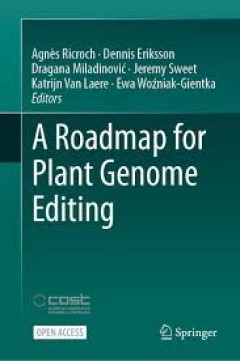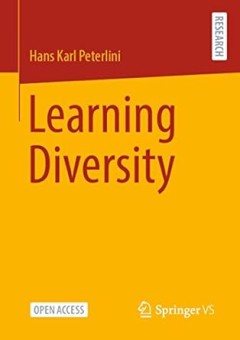Filter by

A Love Letter to the Many: Arguments for Transformative Left Politics in Sout…
South Africa was the hope of the world. It had an impressive and rich tradition of left politics. At the heart of post-apartheid democracy-making was a revolutionary nationalist ANC, the oldest Communist Party in Africa, the SACP, and one of the most militant labour union federations in the world, COSATU. Yet, South Africa is at a crossroads and many are deeply concerned about its future. This …
- Edition
- Volume: 278
- ISBN/ISSN
- 9789004692268
- Collation
- -
- Series Title
- -
- Call Number
- -

A Roadmap for Plant Genome Editing
This open access book is an update of genome editing techniques applied to a range of plants. We discuss the latest techniques and applications to cereals, roots and tubers, oilseed crops, fruit and forest trees, vegetables, legumes and algae including resistance to biotic and abiotic stresses, improved quality, drug production, yield and adaptation to climate change. The regulations in differ…
- Edition
- -
- ISBN/ISSN
- 978-3-031-46150-7
- Collation
- X, 561
- Series Title
- -
- Call Number
- -

Biographical Life Course Research : Studying the Biography-History Dynamic
This open access book explores an approach that connects individual and societal processes throughout history and shifting trends in sociological perspectives, influenced by C. Wright Mills’ theories of time and temporality. It traces its origins from American pragmatist thought and Chicago qualitative sociology in the early 20th century to the revival of biographical research in European and…
- Edition
- -
- ISBN/ISSN
- 978-3-031-44717-4
- Collation
- XI, 178
- Series Title
- -
- Call Number
- -

Primary Physical Science Education : An Imaginative Approach to Encounters wi…
This open access book is the first of two volumes that integrates a study of direct encounters with Primary Forces of Nature, Wind, Light, Rain, Heat and Cold, Water, etc., with imaginative narrative forms of communication. The approach developed in this book shows how the growth of cognitive tools (first of mythic and then of romantic forms of understanding) lets children make sense of expe…
- Edition
- -
- ISBN/ISSN
- 978-3-031-43953-7
- Collation
- XIV, 347
- Series Title
- -
- Call Number
- -

Spationomy : Spatial Exploration of Economic Data and Methods of Interdiscipl…
This open access book is based on "Spationomy – Spatial Exploration of Economic Data", an interdisciplinary and international project in the frame of ERASMUS+ funded by the European Union. The project aims to exchange interdisciplinary knowledge in the fields of economics and geomatics. For the newly introduced courses, interdisciplinary learning materials have been developed by a team of…
- Edition
- 1
- ISBN/ISSN
- 9783030266264
- Collation
- VIII, 325 hlm; ill., lamp.,
- Series Title
- -
- Call Number
- -

Transdisziplinär und transformativ forschen, Band 2 : Eine Methodensammlung
Dieses Open-Access-Buch setzt die 2018 begonnene Sammlung von Methoden für transdisziplinäre, transformative wie nicht-transformative Forschung fort. Auch in Band 2 werden Methoden der Wissenserzeugung, Wissensintegration und Transformation so ausführlich beschrieben, dass Dritte sie umsetzen können. Entwickelt wurden die Methoden von Reallaboren in Baden-Württemberg, sie eignen sich jedoc…
- Edition
- 1
- ISBN/ISSN
- 9783658271350
- Collation
- X, 374 hlm; ill., lamp.,
- Series Title
- -
- Call Number
- -

The Potato Crop : Its Agricultural, Nutritional and Social Contribution to Hu…
This book is open access under a CC BY 4.0 license. This book provides a fresh, updated and science-based perspective on the current status and prospects of the diverse array of topics related to the potato, and was written by distinguished scientists with hands-on global experience in research aspects related to potato. The potato is the third most important global food crop in terms of cons…
- Edition
- 1
- ISBN/ISSN
- 9783030286835
- Collation
- XVII, 518 hlm; ill., lamp.,
- Series Title
- -
- Call Number
- -
The Psychology of Silicon Valley : Ethical Threats and Emotional Unintelligen…
Misinformation. Job displacement. Information overload. Economic inequality. Digital addiction. The breakdown of democracy, civility, and truth itself. This open access book explores the conscious and unconscious norms, values, and characteristics that drive behaviors within the high-tech capital of the world, Silicon Valley, and the sector it represents. In an era where the reach and influenc…
- Edition
- 1
- ISBN/ISSN
- 9783030273644
- Collation
- VIII, 314 hlm; ill., lamp.,
- Series Title
- -
- Call Number
- -

Manual of Digital Earth
This open access book offers a summary of the development of Digital Earth over the past twenty years. By reviewing the initial vision of Digital Earth, the evolution of that vision, the relevant key technologies, and the role of Digital Earth in helping people respond to global challenges, this publication reveals how and why Digital Earth is becoming vital for acquiring, processing, analysing…
- Edition
- 1
- ISBN/ISSN
- 9789813299153
- Collation
- XIX, 852 hlm; ill., lamp.,
- Series Title
- -
- Call Number
- -

Learning Diversity
This Open-Access-book explores diversity in its ambivalence. On the one side, we love to describe diversity as a resource for personal, social, economic, and cultural growth. On the other side, categories of differences often lead to discrimination or serve as justifications for privileges. They can cause exclusion and, conversely, promote the self-constitution of discriminated subjects and gro…
- Edition
- 1
- ISBN/ISSN
- 978-3-658-40548-9
- Collation
- VII, 219
- Series Title
- -
- Call Number
- -
 Computer Science, Information & General Works
Computer Science, Information & General Works  Philosophy & Psychology
Philosophy & Psychology  Religion
Religion  Social Sciences
Social Sciences  Language
Language  Pure Science
Pure Science  Applied Sciences
Applied Sciences  Art & Recreation
Art & Recreation  Literature
Literature  History & Geography
History & Geography